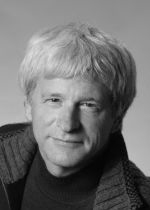Hedersdoktorsföreläsning av Jan Rabaey
– Publicerad den 21 maj 2012

Jan Rabaey, blivande hedersdoktor vid LTH, ger en öppen föreläsning den 24 maj i samband med sitt besök i Sverige. Titeln på föreläsning är "The Wireless Revolution Continued: from Mobiles to Swarms." Den 25 maj promoveras Rabaey till hedersdoktor för sitt ovärderliga arbete för LTH och Institutionen för elektro- och informationsteknik (EIT).
Jan Rabaey, hör hemma inom elektronik och trådlös kommunikation. Han är en av grundarna bakom ett världsledande forskningscentrum, Berkeley Wireless Research Center. Enligt Viktor Öwall, professor i elektronikkonstruktion, är han en väldigt nytänkande och modig person som inte drar sig för att hämta inspiration från science fiction.
– Exempelvis kan hans projekt ”infopad” från början av 1990-talet ses som föregångare till dagens iPad. Han har varit en viktig inspiratör för oss och fungerar bland annat som rådgivare i våra forskningsprojekt, säger Viktor Öwall.
Institutionen för elektro- och informationsteknik hälsar alla intresserade varmt välkomna! Snacks och förfriskningar efter föreläsningen.
Tid: 24 maj 2012 kl. 13.15
Plats: E-huset på LTH, hörsal E:A
Abstract:
It was a dinner conversation sometimes in the mid 1980s that truly kindled my fascination for wireless technology. On a visit to Berkeley, Sven-Olof Öhrvik, then head of Ericsson Radio Systems (ERA) research and Professor at Lund University, ventured that over the next decade cellphones would become both digital and so small in size that they could slip into your shirt pocket. At a time when analog cellphones were barely a niche market, this sounded almost as an excerpt of a Science Fiction novel. The rest is truly history.
Since that very moment addressing the questions on how to make wireless components ever smaller and energy-efficient, and what truly ubiquitous wireless connectivity would mean to the society-at-large, have been leading threads through most of my research activities. It has led us along some exciting paths – from InfoPads and sensor networks to information-technology systems in support of society (CITRIS).
Notwithstanding the amazing impact these technologies have already had, the story does not end here. The wireless revolution is still going strong – wireless devices will continue to become smaller and more ubiquitous, giving birth to “swarms” of sensory and actuator devices that will blur the separation between the physical/biological world and the cyberspace. The endless opportunities this paradigm offers, what is needed to make this happen, and what could prevent it from happening are the main topics of this presentation. Some of it may read as Science Fiction again.
Han önskade sig en iPad för 20 år sedan
Klädetiker, kustforskare och elektronikprofessor blir hedersdoktorer vid LTH
